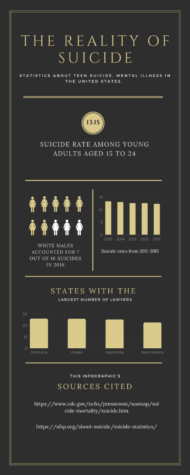
Graduate Christian Holt sits on the floor outside of a computer lab, red-eyed and notably upset. In an attempt to rid himself of his most recent depressive breakdown, he has removed himself from his classroom and gathered his thoughts.
“I’m closed off from others,” Holt said. “It makes it difficult to verbalize what I’m thinking.”
Since eighth grade Holt has combated his depression, which progressively worsened as he left it untreated. He began taking antidepressants in November of 2012. After a suicide attempt in September 2012, Holt checked into a psychiatric hospital for seven weeks.
“It was very helpful,” Holt said. “Those people understand what I was going through.”
Society often perceives depression as a synonym for “sad.” Clinical depression and saddening thoughts — which everyone experiences — hold distinct differences. These cast stark contrasts between individuals who suffer from clinical depression and individuals who experience the occasional bad day.
Lori Cook, former student support counselor, worked with students ages 5-18 at 14 campuses in Texas, many of whom suffer from clinical depression. Ms. Cook advises students who think they suffer from clinical depression to first seek medical attention.
“Your parents, your friends and you cannot diagnose yourself as being depressed,” Ms. Cook said. “After an official diagnosis is made, counseling or medication is needed to help the individual overcome and cope with the depression.”
Studies performed by scientists and doctors attribute a chemical imbalance in the brain to the source of clinical depression. Although many individuals understand the root of depression, according to Holt, it is often trivialized and downgraded as something less than an illness.

“I definitely see people saying ‘You’ll get over it, move on,’” Holt said. “Sure they’re trying to be kind but it’s really very annoying. They don’t know how it works.
According to Teen Help, around 20 percent of teenagers experience depression before adulthood and approximately 5 percent of teenagers suffer from major depression.
Seventy percent of teens will have more than one depressive episode before adulthood.
“Friends are supportive to an extent,” Holt said. “They think it’s something that’ll come and go.”
While society may trivialize the illness, leaving clinical depression untreated can lead to devastating consequences. Holt remains optimistic regarding other’s battles with clinical depression.
“Whenever you’re in a stressful or depressing situation,” Holt said, “get out of it.”
However, according to Lori Cook, the initial reaction should be seeking medical attention.
“First, you must see a medical professional or mental health professional to get a professional diagnosis of clinical depression,” Cook said. “Clinical depression can absolutely be overcome with the proper course of treatment which ideally includes counseling and medication together.”
